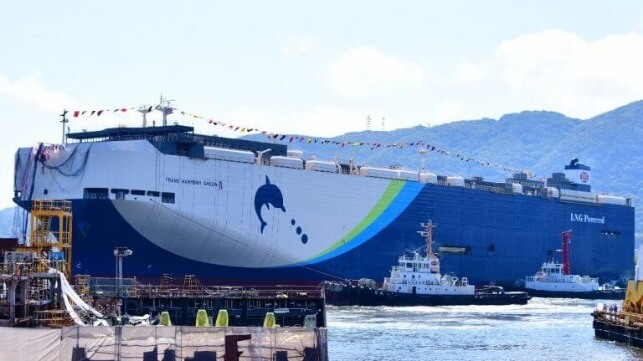Mitsubishi Shipbuilding Joins Methanol Sector with Order for First RoRos

Japan’s Mitsubishi Shipbuilding is joining the emerging group of shipyards capable of building ocean-going methanol-fueled vessels. While the alternative fuel is dominating new orders, with 269 orders due for delivery over the next five years according to DNV, only a few shipyards are building the vessels.
Mitsubishi Shipbuilding signed an order for Japan’s first methanol dual-fuel RoRo car carriers. The two ships will be deployed on a Japanese coastal service and designed to address the emerging trends in shipping.
Toyofuji Shipping is ordering two ships as part of a promotional project jointly sponsored by the Ministry of the Environment and the Ministry of Land, Infrastructure, Transport and Tourism. Toyofuji will own the first vessel and the second with be shared with Fukuju Ship Company. Both vessels are due for delivery by the end of 2027.
In addition to being the first dual-fuel methanol-fueled RoRos for Japan, the vessels will incorporate other design elements to improve efficiency. They will be equipped with Mitsubishi’s energy-saving technology system and energy saving propellers and high-performance rudders with reduced resistance. They will have a high-efficiency dual-fuel main engine and the shape of the bow and vertical stem is designed to reduce propulsion resistance.
The ships will be larger than the conventional coastal car carriers. The length will be increased by approximately five meters (more than 16 feet) and the tonnage will increase from 12,687 to 15,750. Loading capacity will expand by 15 percent or 300 vehicles to a total of 2,300 units. This will permit the companies to reduce CO2 emissions by more than 20 percent per unit. Overall, they expect an initial 10 percent reduction in CO2 emissions which can be further increased through the conversion to green methanol. Mitsubishi Gas Chemical Company and Kokuka Sangyo will supply the methanol bunkering from conventional vessels.
While the ships are larger, they will be able to call at conventional ports. The size increase will also address the labor shortages being experienced in the shipping industry as well as the calls for work style reforms. The increased loads will provide more schedule flexibility and rest time for crews.

that matters most
Get the latest maritime news delivered to your inbox daily.
Mitsubishi Shipbuilding reports it will expand on its experience with LNG to develop the new vessels. The Enoura shipyard in Shimoseki City earlier this month launched the first LNG-fueled car carrier for Toyofuji Shipping. Named Trans Harmony Green, the vessel is 49,500 tons with a capacity for 3,000 vehicles. It will be operating the company’s Asia weekly service.
Methanol-fueled car carriers are a new segment for the emerging alternative fuel. DNV reports less than seven percent of the methanol-fueled orderbook is for car carriers with only 18 vessels ordered so far for the segment. Containerships continue to make up the vast majority of the orders for methanol-fueled vessels although other segments are starting to emerge.
